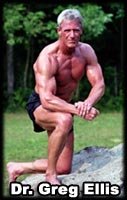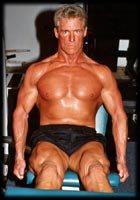MM: Do you work with any athletes right now?
 DE: Not really. I work with a few people such as Brazilian Jiu-jitsu champ Steve Maxwell. However, for the most part I work with really sick people.
DE: Not really. I work with a few people such as Brazilian Jiu-jitsu champ Steve Maxwell. However, for the most part I work with really sick people.
MM: What is your background?
DE: Academically, I have a PH.D degree from Temple University School of Medicine's Department of Physiology. I am also a certified nutrition specialist with the American College of Nutrition.
MM: What shape are you in right now?
DE: I am 55, 196lbs, 5.5% bodyfat. One thing that I like doing to really burn calories is to wear a 40lb weight vest and walk 8 miles a day. I tried an 80lb one for 8 miles as well and that just about killed me. So now I stick with the 40lbs and do that regularly. Walking eight miles with a 40lb vest does not phase me one bit.
MM: I know that you are an advocate of low-carbohydrate diets. How did you discover the benefits of this approach?
DE: Well it all started when I began working out at age nine. My parents split up when I was twelve and I got really fat. I had the tools available to me at that age in the early 1950s via muscle magazines. At the time, there was still a relationship between the whole physical culture movement, exercise, and diet.
MM: You mean that people actually wanted to be healthy, strong, and look good?
DE: Yes, people were well read as this was before steroids entered into it and then they went in separate directions. Anyway, I did a great deal of reading trying to pick the obesity puzzle apart. I started following different diets and routines and they did not get the job done. I tried two-hour abdominal routines and of course did not get a six- pack. I soon realized that none of the lay stuff was getting me anywhere and I decided to go back to school and get a degree.
MM: Did you find what you were looking for?
DE: No. Unfortunately, I learned that people in medical school did not know anything either. Nevertheless, the training and background gave me the ability to read any scientific journal. That is where my real education began. In 1977, I finished medical biochemistry and now nothing could stop me as there was nothing that I could not read. After doing extensive research on the protein needs of athletes I soon realized that everyone was wrong. The papers were very clear that athletes need much more protein than sedentary people. I realized that a lot of doctors did not know how to do medical research and were getting their information from the media. Thus, I realized that I needed to eat a lot of protein and that meat and eggs were the best place to get it. However, at the time, everyone was telling you that those were the causes of heart disease. I researched that topic as well and soon realized that it was false. The whole thing was completely fabricated. I started shoving in the protein and began to grow again.
MM: What do you think of the Atkins Diet?
DE: I tried the Atkins Diet and instead of losing weight, I gained 5lbs of fat. What I realized later on through research is that Atkins does not realize that calories control body weight rather than carbohydrates. You cannot just eat all the protein and fat that you want and expect to lose bodyweight and fat. You have to make adjustments in calories as you gain and lose weight. Calories have to be adjusted. For my PH.D I continued to study fuel metabolism and the interrelationship between carbohydrate use and fat use as sources of fuel. I read a book entitled "The Fat of the Land" and decided that I was going to eat just meat and nothing else. I had two steaks a day and experienced the best results of my life.
MM: What kind of results did you achieve?
DE: I experienced a significant decrease in body fat and increase in muscle -- a few pounds either way -- nothing like the EAS/Body for Life promoters would have one believe is possible. Also, my energy did increase profoundly along with strength and training endurance. I'd say energy increases are the most profound response. My sense of well being, my health, my skin, sleep, bowels, all improved because of this regimen. This is a common finding among those following this regimen after they adapt to it. All of the reported bad effects occur only in the first week or two before adaptation takes place.
MM: Do you consume any carbohydrates at all in your current regimen?
 DE: I keep it as low as I can. I cannot tell you whether zero is really better than 60 grams. I know that most people will not be that strict with carbohydrates. I do think that it is better if you can do it. What people do not understand is that the minute you eat carbohydrates, it is converted into glucose and then fat. The main purpose of carbohydrates is to be converted into fat. The eating of carbohydrates induces a nutritional and hormonal profile that favors deposition of body fat. If you get your overall carb intake below 25% of calories you will begin to get positive results. You don't have to go ridiculously low such as 20-40 grams to receive benefits.
DE: I keep it as low as I can. I cannot tell you whether zero is really better than 60 grams. I know that most people will not be that strict with carbohydrates. I do think that it is better if you can do it. What people do not understand is that the minute you eat carbohydrates, it is converted into glucose and then fat. The main purpose of carbohydrates is to be converted into fat. The eating of carbohydrates induces a nutritional and hormonal profile that favors deposition of body fat. If you get your overall carb intake below 25% of calories you will begin to get positive results. You don't have to go ridiculously low such as 20-40 grams to receive benefits.
I am not that strict about the whole thing and at age 55 do not really care any more like I did when I was 25. I got down to 5.5% body fat recently in a little experiment that I did and reached my goal. The trade off is that I think that I could have 10lbs more muscle if I went lower on carbohydrates.
MM: Really, I thought that the opposite would be true.
DE: Why? How can you gain muscle by consuming carbohydrates?
MM: Well, there is the theory that carbohydrates spare protein so that protein can be used to build muscle.
DE: Well, I am aware of that theory, but it is completely wrong. In the 1950s they did an experiment with rats in which one group was given 100% carbohydrates. They lost weight, but got fatter. What went away?
MM: The muscle?
DE: Precisely. The muscle provided the fuel the whole time. Carbohydrates or glucose does not spare protein. What really spares it are ketones.
MM: How do ketones spare muscle?
DE: Since ketones are the muscle's preferred fuel, their presence slows the rate of protein degradation while enhancing the rate of protein synthesis. The presence of ketones indicates a nutritional and hormonal profile that is one of the hunger state vs. the fed state, in which the signals are provided by glucose, insulin, or a high insulin/glucagon ratio. All systems are in a fat burning mode and not a fat storage mode. Since it makes sense in the "wisdom of the body" to preserve its muscle and burn its fat, this is the evolutionary status quo and both occur during the production of ketones whose source is the triglycerides in the fat cell (release dictated by low insulin) and whose manufacture occurs in the liver (high glucagon). When this fuel is available and is actively being burned by the tissues, there is no signal to degrade muscle protein to supply amino acids as a source of carbon skeletons to make glucose because the organism could care less about glucose because it has its primary fuel and is very happy. Also the hormonal profile of low insulin, high glucagon, higher epinephrine, elevated growth hormone and testosterone all contribute to the preservation of muscle tissue and even to its enhancement if there are sufficient calories and a muscle-building stimulus.
MM: You do feel that consuming carbohydrates after a workout assists with post workout recovery?
DE: Let me give you a model to put it in perspective. Humans for the last 10,000 years have been eating largely carbohydrates, even more so in the last 300 years with the rapid increase in sugar. Thus, we have a load of science out there that has studied man the carbohydrate eater. We do not have much on man the fat eater. What happened is that some guys got the idea that glycogen, which is your stored glucose in your muscles and liver, was very important in endurance performance. Most of the glycogen-loading experiments were done by Swedish exercise physiologists in the late 1960s. They put subjects on nothing but protein and fat which depleted the glycogen levels stored in muscles over three days. Then they kept one group on meat and fat for three days and super-fed the other group for three days with a high carbohydrate diet. This super-compensated their glycogen levels. Then they tested them on an exercise bike on day seven. The guys on meat and fat did 50% of the work that they did before the experiment. The high carbohydrate guys did 125%. Thus, this led to the whole notion of the benefits of glycogen loading and the importance of carbohydrates. I do not disagree with this under the conditions of the experiment. However, they made the mistake of extrapolating this data and saying that it would be true under all circumstances. This is false.
MM: How so?
DE: The experimental design never allowed enough time to have the high fat and protein group adapt to the diet. If you are not eating much fat, your body takes away the enzymes that process fat. These guys in the experiment did not have the enzymes to process fat efficiently. It takes 4-20 weeks for those enzymes to max themselves out. Once that occurs, you turn into an energy powerhouse and will blow the glycogen guys away. They will not even be able to compete. Low levels of glycogen, if you are a carbohydrate eater, only if you are a carbohydrate eater, only impact people that do long bouts of exercise. Hard training bodybuilders and trainers will not even come close to depleting glycogen. The vast majority of energy comes from fat and thus glycogen loading is a waste of time. People do not want to admit that and would rather diss fat all day long.
MM: Very interesting. So getting back to adding muscle on a low carbohydrate diet, you would just lower the carbohydrates and eat more protein to gain more muscle?
DE: Yes and increase fat as well. That is the key
MM: How would you do that, by taking in oils etc?
DE: No, just eat more meat. No need to micro-manage.
MM: What do you think about the whole discussion on Alkaline/Acid balance?
DE: That theory is garbage and let me explain why. Do you know what your body- temperature is?
MM: 98.6 degrees.
DE: Do you think that mine is the same?
MM: Yes
DE: Okay it is obvious to you if you think about it that your body is regulated by inborn homeostatic mechanisms which is happening in each and every one of us. Most of the vital things in our bodies are highly regulated. Stuff like blood sugar, pH, temperature are all highly regulated. Any deviation can lead to death. The blood pH that people talk about is about 7.35, pH in the muscle cell is about 7.0. Any thing done to disturb the pH of the body is going to be fought against by the regulatory system. Thus, the notion that one can even change the acid/alkaline balance is just absurd. Eating something is not going to change your acid/alkaline balance.
MM: If carbohydrates turn into fat in the body, how come so many people that consume a lot of carbs are in great shape?
DE: No ifs about it Mike, carbohydrates do turn into fat in the body. You can't focus on only one aspect of the bodyweight, body composition continuum to arrive at an answer to this question. We must look at what conditions optimize these processes because optimization is a different frame of reference than "great shape." One can be in great shape yet have not optimized the process. Now, if you just want to be in great shape than that can be accomplished on carbs as you have observed. But, one will not have optimized the process, meaning at any point in time, the carb eater will have less muscle and, possibly, more fat on his body than the low carb eater.
MM: What role does genetics play?
DE: Clearly, genetics and drugs and training all enter the picture as other modifiers of the final outcome, but using diet comp only, carbs will lead to more fat acquisition and muscle loss than protein and fat in the absence of carbs. As I've said, people's desire to hold onto this carb thing clouds the issue. But, you simply cannot hold onto these observations in the face of the overwhelming data showing that what happens at the cellular level causes predictable changes at the whole body level. We know that glucose is converted to fat and that the primary source of body fat is glucose and the eaten fat is not a source of body fat in the absence of glucose. We even know this at the textbook level, which means that it is very well known, no longer just a theory but a fact. So how can one overcome the conversion of glucose into fat and still remain lean? What about the "big" carb eaters? Easily explained by genetics, training, drugs, or any possible combination of those factors. What's the final outcome across the spectrum? The only possible outcome is that anyone eating carbs will possess more fat and less muscle, calorie for calorie, than one consuming protein and fat. No other outcome is possible.
MM: Is there any proof to support these claims?
DE: Yes, both animal and human models of this outcome are represented in the literature. I detail both in my two books and the results are pretty significant. In conclusion, the use of one subject, or the use of observations, can never be the criteria for judging the efficacy of some treatment, particularly when the extant literature shows and outlines what actually happens. This is the underlying basis of my books: find out what really happens and then your program arises so that you can push the body in the direction it wants to go.
MM: How do you feel about Caffeine?
DE: My business partner out in LA read me a piece since we are doing some work for a company called Metabolife. The piece showed that caffeine can effectively kill cancer. It did not matter if the cancer cell was benign or malignant. Green tea was also involved yet they felt that caffeine was even more effective than green tea. You can search caffeine and cancer on the web to get this recent research.
MM: I forget where I read it but I read something about too much green tea actually causing cancer?
DE: Garbage. People just make up so much crap in our industry right now. Everything that could be said has been pretty much said. What are you going to do with a subject when you have 200 magazines out there that need articles. Thus, they just get people to make stuff up to look innovative and cutting edge. Look at bodybuilding, people have to just get bigger, bigger, and bigger. We cannot be satisfied with the physiques of the 1960s. Everything just keeps getting more preposterous. Look at Body for Life, that is the most preposterous thing out there. None of that stuff is real or true, it is all fabricated.
MM: Recently at t-mag, there was some discussion regarding the negative effects that caffeine might have on insulin activity. What are your thoughts on this?
DE: The research he quoted is accurate but only under limited conditions. What needs disputing is the underlying philosophy. Insulin resistance has a negative connotation to it just like ketones because both conditions were first observed in diabetics and have been, ever since, considered very negative responses tied tightly to disease. It is one thing to study man the "carbohydrate-eater/diseased-man" and an entirely different thing to study man the "fat-eater/man-not-diseased." One cannot extrapolate the findings in one group to the other, yet it is done all the time. So now what would benefit one group is extrapolated to benefit the other. This is very poor science. It is likely that consuming caffeine along with carbs is a bad idea just as consuming carbs w/o caffeine is a bad idea. Of course, an even worse idea is to eat few carbs for a couple of days and then to load carbs for a few days, and, as well, to starve and then to eat a lot of food in one meal along with carbs. All of these are bad actions. But, on the other hand, if you consumed caffeine along with a low-carb diet, it would enhance the fat burning process, the ideal condition of man.
MM: Are there any nutritional supplements besides your own that you think are beneficial for athletes?
DE: I think that there are a few things that are pretty good. The problem is I think that people start getting into micro managing when it comes to supplements. No supplement will make anywhere near the same effect as hitting the barbells. For example, with creatine you get your 5-7lbs and we don't really know if it is water or muscle at this point. That is it and that is all that you get. If you are eating a meat based diet then the creatine does not do anything. I like supplements such as Alpha Lipoic Acid and NADH. But you have to ask yourself, how much do you want to spend and are you getting the benefits that you want. The bottom line is that none of the supplements are going to do that much. I here people say, this really worked for me. However, what does that mean? What did it do? I don't want subjective answers, I want to see controlled studies with meaningful results and that is not going on at all. Thus when I advice people on supplements, I tell them to get all of the essential vitamins and minerals down first and then pick a few nutraceuticals that we know will make a contribution.
MM: Is it important to get your meat from organic sources?
DE: Great if you can, but I do not really worry about it that much any more. After all of my hippie days in the 70s when I worried about everything I pretty much dumped all that stuff. I think that toxins in food are a huge problem and one of the biggest today. Regardless, I do not stress about it and just get a steak at the local market.
MM: Does it matter how many times you eat a day?
DE: Absolutely! Eating once a day for example is disastrous. What happens when you only eat once a day is you induce the laying down of a lot of that food into bodyfat. It induces a dramatic increase in your lipogenic enzymes, which is the production of fat from glucose. These enzymes go up 1,000% in activity when you eat this way. In addition, you will eat a lot more food in one sitting when you eat once a day which will result in excess calories. Your body adapts and knows that it is all that you are going to get. In one study, rats eating one meal a day that only ate 80% as much as rats eating whenever they wanted throughout the day ended up with 15 grams more body fat and 8 grams less muscle. A diet of one meal a day is not going to get you what you want. Especially guys like us who want more muscle and less fat.
MM: Should people eat three meals a day? five?
 DE: Well that is micro managing as well, trying to eat six meals a day is unnecessary. The six-meal concept came from the idea that if you spread your meals out it will induce a profound thermogenic effect. Of course this is not true at all. The thermogenic effect from food is about 10% of your total daily calorie burn. I am not fanatical about meal frequency and usually have a small breakfast, a good lunch, if I get hungry around 5-6pm, I will eat some cottage cheese, peanut butter etc. Then have some meat on a plate for dinner. I think that you can avoid the negative effect of the one meal a day concept and the drudgery of preparing six meals a day by eating three meals. Just have one or two big meals and one small one.
DE: Well that is micro managing as well, trying to eat six meals a day is unnecessary. The six-meal concept came from the idea that if you spread your meals out it will induce a profound thermogenic effect. Of course this is not true at all. The thermogenic effect from food is about 10% of your total daily calorie burn. I am not fanatical about meal frequency and usually have a small breakfast, a good lunch, if I get hungry around 5-6pm, I will eat some cottage cheese, peanut butter etc. Then have some meat on a plate for dinner. I think that you can avoid the negative effect of the one meal a day concept and the drudgery of preparing six meals a day by eating three meals. Just have one or two big meals and one small one.
MM: Well, it has been a real pleasure talking to you. Thanks for taking the time.
DE: My pleasure and thanks for doing the interview.
For More information on Dr. Greg Ellis and his innovative supplements and books, go to www.ultimatedietsecrets.com.
Click here to buy my book or go to: http://www.myaffiliateprogram.com/u/geinfo/t.asp?id=1046.
About The Author
Mike Mahler is a strength coach and a certified kettlebell instructor and has been a strength athlete for over ten years. Mike designs functional strength training programs for combat athletes, law enforcement, firefighters and is available for phone consultations and personal training in the Los Angeles area as well as the DC/VA area. If you would like more information on a personalized strength training and nutrition program to address your needs or to set up a phone consultation, please e-mail Mike at mahler25@yahoo.com or visit Mike's site at www.mikemahler.com.
Thanks,
